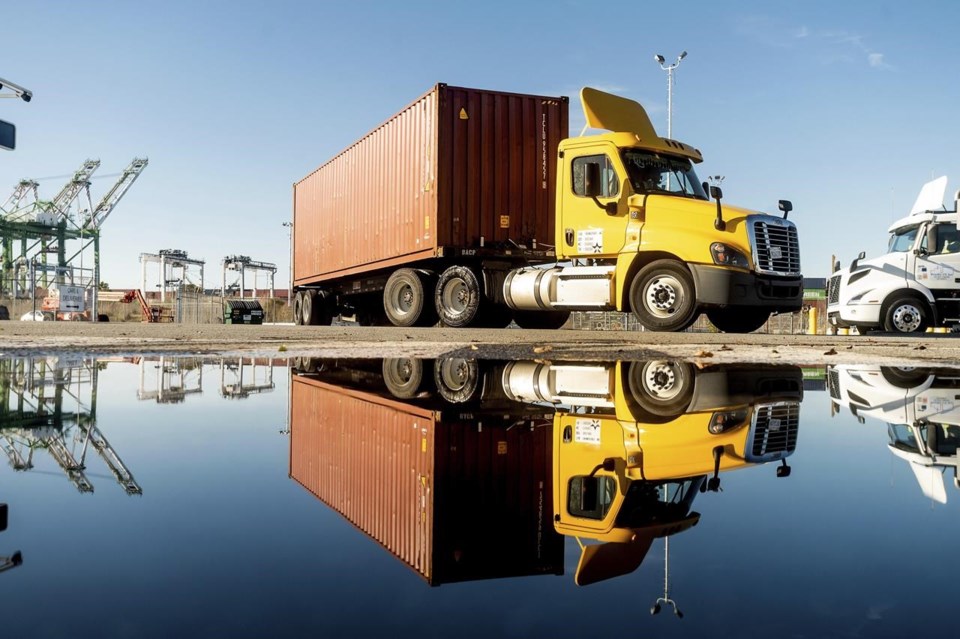SACRAMENTO, Calif. (AP) — New big rigs and buses that run on diesel would not be sold in California starting in 2036, according to new rules approved by state regulators Friday to wean the state off fossil fuels and combat climate change.
The rule would tackle pollution from heavy trucks used to transport goods through ports and require companies to disclose their use of these so-called drayage trucks by 2024.
The rule cannot be implemented without approval by the U.S. Environmental Protection Agency. But it's related to standards the Biden administration already approved last month to phase out diesel-powered box trucks, semitrailers and large passenger pick-ups. If the EPA approves California's rule, other states could later adopt the same standards.
Democratic Gov. Gavin Newsom touted Friday's move as a chance to show “the world what real climate action looks like.”
“We’re one step closer to achieving healthier neighborhoods and cleaner air for all Californians,” he said in a statement.
The state continues to approve ambitious emissions standards as part of its broader goal of achieving carbon neutrality, meaning it would remove as many carbon emissions as it releases, by 2045. Air regulators previously voted to require that all new cars, pickup trucks and SUVs be electric or hydrogen by 2035. And they have banned the sale of new products run by small gas-powered engines, including leaf blowers, lawn mowers and portable generators.
The truck emissions vote follows the California Air Resources Board’s approval Thursday of a rule phasing out decades-old diesel locomotives and a transition to more zero-emission technology to power trains that transport food, lumber, oil and other products.
But some in the trucking industry are concerned the rule will ultimately increase prices for goods that are trucked.
The American Trucking Associations called the rule “unrealistic." The group is worried about how expensive a drastic shift to zero-emission vehicles will be and says vehicle-charging infrastructure is not equipped for the transition.
“As it becomes clear that California’s rhetoric is not being matched by technology, we hope the Board will reverse course and allow trucking companies the freedom to choose the clean technologies that work best for their operations,” the group said in a statement.
Emissions from trucks have already gone down drastically in recent decades, it said.
More than 100 models of zero-emission trucks are available in North America, state regulators say. On top of that, more than 100 others are being produced.
Friday's rule, combined with previous electric truck regulations approved by the state, would mean more than 1.6 million zero-emission medium- and heavy-duty trucks would operate in the state by 2048.
Nationwide, the transportation sector contributes the largest share of greenhouse gas emissions annually, according to the EPA, with medium- and heavy-duty trucks contributing nearly a quarter of those emissions.
Heavy-duty vehicles make up about 3% of vehicles on the road in California, but they generate more than half of nitrogen oxides and fine particle diesel pollution, according to the California Air Resources Board. That’s because these trucks have diesel engines that, while more powerful, produce more pollution than gasoline engines. They also travel many more miles than passenger vehicles.
California has lots of these trucks on the road because it has two of the busiest ports in the world at Los Angeles and Long Beach.
Long Beach resident Theral Golden said the truck emissions rule is overdue but he wants officials to go further by downsizing the ports.
“We need additional relief,” Golden said.
Of the top 10 most ozone-polluted cities in the U.S., six are in California, according to the American Lung Association’s State of the Air report.
“You can’t overstate the importance of the actions taken in California today from a public health perspective,” said Will Barrett, national senior director for clean air advocacy for the American Lung Association.
Sam Wilson, an analyst with the Union of Concerned Scientists, said in a statement the technology is available to start transitioning toward electric trucks.
“We need this standard to accelerate the necessary phase-out of fossil-fueled trucks that are fouling our air," Wilson said.
___
Associated Press writer Adam Beam contributed to this report.
___
Sophie Austin is a corps member for the Associated Press/Report for America Statehouse News Initiative. Report for America is a nonprofit national service program that places journalists in local newsrooms to report on undercovered issues. Follow Austin on Twitter: @sophieadanna
Sophie Austin, The Associated Press



